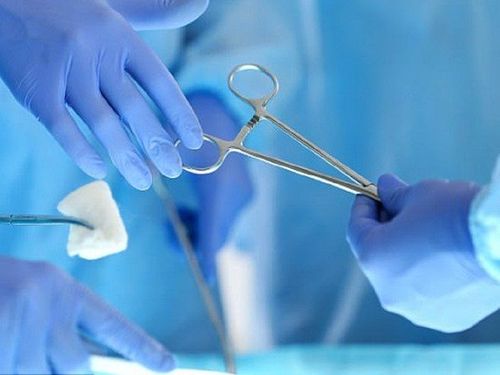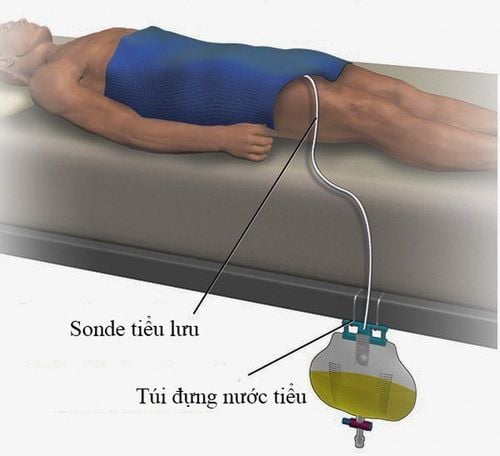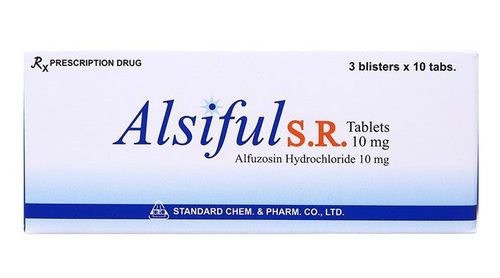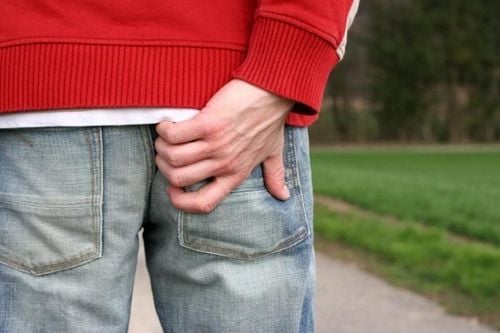This is an automatically translated article.
The article is expertly consulted by Master, Doctor Le Phuc Lien - Urologist - Department of General Surgery - Vinmec Nha Trang International General Hospital. The doctor has more than 12 years of experience in the field of urology and specialized urology.Most of the patients after surgery often experience urinary retention, urine cannot be drained, causing abdominal distension and discomfort for the patient. Without intervention, urinary retention after surgery can affect the patient's health.
1. What is urinary retention after surgery?
Urinary retention is a disorder of the urinary tract, the patient feels the need to urinate but cannot urinate.Urinary retention is a common complication in postoperative patients, especially hemorrhoid surgery patients. There are many causes of urinary retention after surgery, but most cases of urinary retention after surgery are due to the patient's limitation of movement. Patients with a history of bladder dysfunction or kidney disease are at increased risk.

Có nhiều nguyên nhân dẫn tới bí tiểu sau phẫu thuật
2. Treatment of urinary retention after surgery
In order to avoid urinary retention after surgery, first of all, patients should be encouraged to move around soon after surgery to avoid lying down for too long. In addition, the patient needs to drink a lot of water so that the kidneys can excrete urine according to the natural mechanism.However, for patients with congestive heart failure and edematous conditions, fluid tolerance is not high. Patients should consult with their doctor before applying these treatments for urinary retention.
Along with that, to improve urinary retention and urinary retention, patients need to add foods that help with diuretics including:
Vegetables: Radish, cabbage, cucumber, celery, carrot , tomatoes ... are foods containing a lot of water to help increase the amount of water needed to urinate. Some fruits: Melons such as watermelon, melon,... Citrus fruits such as oranges, lemons, tangerines,... Tea and coffee: The patient may be advised to drink coca, coffee and tea. Green tea because these are very good diuretic drinks. However, it should be noted that drinking too much is not good for health. In necessary cases, when treating urinary retention, your doctor will prescribe a number of diuretics including:
Alpha receptor blockers are a group of drugs used to treat problems with the urinary tract. They relax the muscles in the bladder and reduce factors that interfere with urine flow. These drugs are often used to treat long-term problems associated with urinary retention, especially an enlarged prostate. 5-alpha-reductase inhibitors. 5-alpha-reductase inhibitors help to shrink the size of the prostate, so they are only prescribed for men. This medication can take weeks or even months to work, depending on how long the prostate reduction takes to work. Finally, the patient may need to insert a urinary catheter to drain urine if the urinary retention does not improve. After that, the patient must practice urinating through the catheter to return to normal urination. When the patient is able to urinate on his own, the doctor will instruct the doctor to remove the urinary catheter.

Đặt sonde điều trị bí tiểu sau phẫu thuật để dẫn nước tiểu ra ngoài
3. Prevention of urinary retention after surgery
Postoperative urinary retention is an underestimated and largely preventable complication. Methods to prevent urinary retention after surgery include:
Mobilize early after surgery Do exercises for the abdominal muscles, and pelvic floor. At that time, the tight abdominal muscles will press on the bladder. Rub the abdomen to stimulate the bladder. Urinating when you feel the urge: When you feel the urge to urinate, you need to urinate immediately, do not hold your urine. Clean the urinary tract regularly to prevent it. prevent urinary tract infections. Proper hygiene is necessary: Wipe from front to back, wash the area between the vagina and rectum daily, and urinate immediately after sex. Urinary tract abnormalities and disorders, factors, or conditions that may predispose to urinary retention should be promptly treated. Urinary retention is a urinary tract disorder in which the patient feels the need to urinate but is unable to urinate. Postoperative urinary retention is a preventable complication.
Therefore, patients after surgery should pay attention to exercise and appropriate diet to prevent urinary retention. When there is a feeling of abdominal distension and inability to urinate, it is necessary to notify the doctor immediately for examination and timely intervention.
Please dial HOTLINE for more information or register for an appointment HERE. Download MyVinmec app to make appointments faster and to manage your bookings easily.













